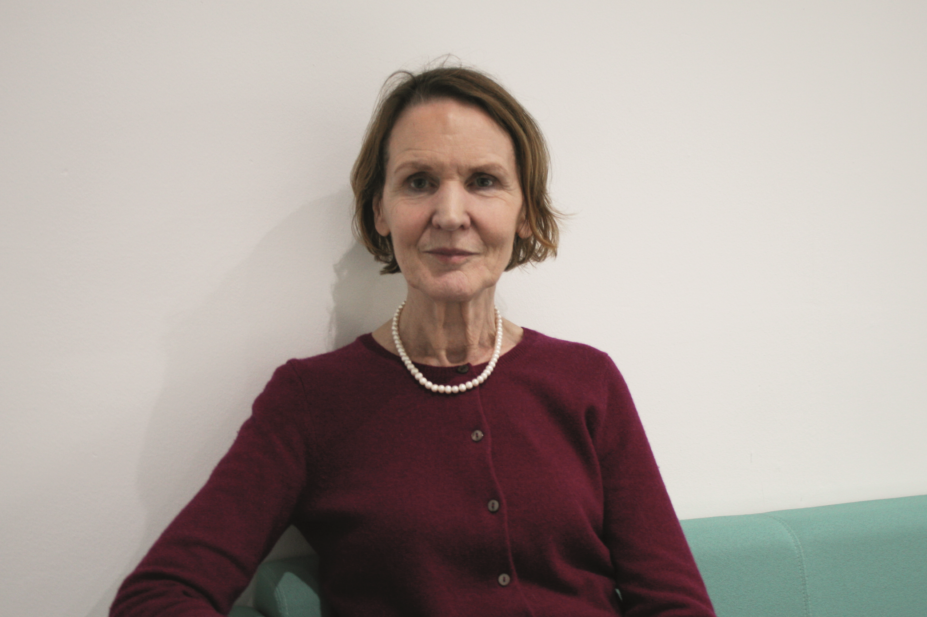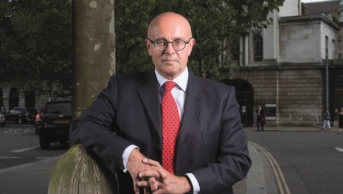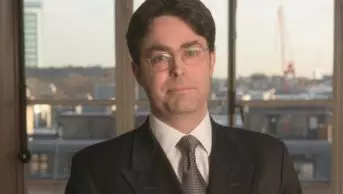
Julia Robinson / The Pharmaceutical Journal
After 17 years at the Pharmaceutical Services Negotiating Committee (PSNC), chief executive Sue Sharpe will be leaving her position at the end of May 2018, to spend more time with family. However, she says, she will not yet be leaving the world of pharmacy altogether.
Here, Sharpe talks to Julia Robinson about how pharmacy has changed over the course of her career, expressing her view on why the relationship between the PSNC and the Department of Health (DH) broke down after funding cuts for community pharmacy were announced in December 2015, and explaining why she remains optimistic about the future of the pharmacy profession.
How has community pharmacy changed since you started in the profession?
I think it is hard to understate the change that has happened from the time before I joined PSNC, when the pharmacy contract was really just supply — just the shift of prescriptions.
There was a real absence of any recognition of what the professional pharmacist in a community setting can provide to the public.
I think we changed that quite fundamentally in the new contractual framework that came into place in 2005, which introduced medicines use reviews but also recognised the role of pharmacy and the pharmacy team in supporting self-care. That built on quite a lot of work that the Royal Pharmaceutical Society (RPS) had been doing in the years before that — introducing recognition of the role of pharmacists in public health, public health campaigns and messaging — but also the really unexciting aspects such as returning waste medication for safe disposal.
So that contractual framework really began a process, although it hasn’t gone anything like as far as we had hoped it would, of recognising that the pharmacist, as a clinical professional supported by trained staff in a community pharmacy setting, was offering much, much more than simply supply. Yes, dispensing prescriptions was the core around which a lot of the relationship work was based, but there was a tremendous amount more going on.
The other thing is signposting people, so people coming in with a symptom and then a pharmacist either saying “I’ll look after you”, “you should go to your GP” or “you really need to get down to the hospital”. Pharmacists do all of this, but those years where the contract was just seen as a supply contract were pretty dark, where the reward and the recognition for all the professional care was missing.
What more needs to be done to improve understanding among healthcare professionals and the public?
We still work in much more of a silo than I wanted to see by this time. We have worked to create recognition of the value of pharmacy as part of the primary care team and working closely with GPs. And in some cases that happens, but as part of the healthcare system it is just not there.
If you look at sustainability and transformation plans (STPs), pharmacy is still not in there as of right. We’re still much more on the margin of the primary care network than we should be in reality. There’s a lack of any real understanding among healthcare policy decision makers in NHS England in particular, of just how pharmacy is a real contributor in meeting people’s health needs.
Pharmacy needs to make itself more visible. It also needs to think much more as a team player and I think it probably needs to go and get the data and research about the value and shove it down people’s throats, in a clinically effective way! It is a question of getting real data and not just anecdotes. Pharmacy needs a consistent, high-quality offering, but we need to prove just what that is and what a world without a strong network of community pharmacists would look like in terms of the burden it would put on the NHS — even if it is just differentiating the people who need NHS care and those who can be managed with support and reassurance or pointed towards information sources and self-help sources.
How should pharmacy organisations and leadership bodies handle the continued funding cuts in community pharmacy in England?
The pressure of the funding cuts on community pharmacy are no different from those that were being applied in other parts of the NHS, and are less than some — hospitals were having to achieve 4% or 3% efficiencies. If you look overall, I don’t think those funding cuts were abnormally targeted. However, there were some real concerns about the process, the failure to engage, the other policies that were tucked underneath it, which I think were ill-formed, ill-thought-out and potentially lethally damaging to some pharmacies.
The process was appalling and I think reflected a high level of ignorance in policy formation. What has happened in the last six to nine months is that, combined with those funding cuts, we have had further reductions in income to pharmacies because they’ve had to repay some surplus margin which pretty much doubled the impact of the funding cuts. And pharmacists have had to cope with significant increases in the prices of many generic medicines.
We will get through this, but it will take time — and of course we know that the government’s position, set out in that letter at the end of 2015, was that there were too many pharmacies in many areas. So I think the pressure, particularly on the lower volume dispensing pharmacies, is not accidental; I’m really worried that they will lose the pharmacies that really provide valuable services to needy populations in communities that have particularly high health needs and under-doctored areas. It’s brutal.
Why do you think the relationship between the PSNC and the Department of Health broke down? Can it be salvaged, and if so, how?
First of all, we’re working very constructively now with the DH. I think we’ve worked through those very dark days.
Why do I think it broke down? I think there was a deliberate policy of saying the PSNC will probably object, and indeed some of the papers we saw in the course of the judicial review validate this. So I think they spread the net of the people they were consulting with very widely. A letter was published which had never before happened, they involved other people — I think in a hope of dividing and conquering and to dilute our influence — to try and get them to say that maybe it’s time for a great shake-up.
So I think it was a deliberate policy, you could see it if you were there, by the body language; you could see it in the process; you could see it just by the mere fact of publishing a letter, which they’d never done before and didn’t do with any other representative. It takes two to tango or work together, and if one side throws their toys out of the pram there’s not much that the other side can do about it.
But I will emphasise that it’s really important for us at the PSNC to work with NHS England and the DH on behalf of community pharmacies so we have to seek every day to do the best we can to work with them. Through the process of the judicial review it was a pretty silent relationship, but we just wouldn’t be doing our job if we were still avoiding talking to them.
What are the other big issues facing community pharmacy in the next five years and how would you like them addressed?
I think a massive challenge is about whether medicines can be supplied remotely, and I think the threat of the big remote dispensing warehouse operations and the impact of that on people, how they access care and how they think about pharmacy, should not be discounted.
I think the impact of technology on how people meet their healthcare needs is really essential for pharmacy to get its head around. I think pharmacies need to think about a much more blended approach of the bricks and mortar and the online offering. Most other retailers have had to do this.
I think there are a lot of challenges there for pharmacy but I think there are also opportunities.
The moves of the NHS to stop routine prescribing of over-the-counter medicines for self-limiting conditions creates opportunities for pharmacies to add value to their patients and local public.
At a national level, our challenge will be to protect and develop the role that we do today in helping people manage long-term conditions in particular. We’ve got an ageing population and increasing recognition of the importance of mental health in pharmacy, and pharmacies need to work out where they fit into that space. I think there’s a tremendous range of factors that will either combine to provide a very interesting and exciting, healthy future for community pharmacy or one where people will look back in 30 years’ time and say, well they really missed the boat.
What is your view on pharmacist supervision in community pharmacies?
You’ve heard me talk about what pharmacists working with skilled teams in the community, do. Take pharmacists out of that equation as a standard part of the framework and I think you’ve lost the unique selling point of the profession. Not every single prescription needs this intervention, but enough patients benefit from the pharmacist’s oversight, scrutiny, and thinking about the patient and the medicine. I think it would be a disaster.
The word supervision doesn’t work for me, it sounds like something that happened in prep when I was at school — I think it’s very unfortunate terminology. The involvement of the profession at that point of handover of the medicine to the patient, and looking at the suitability and looking at anything else that is going on: this is really valuable. Opportunities for advice and care that we fail to document but we know have value.
In light of the demise of Pharmacy Voice, which pharmacy bodies do you think will still be here in 10 years?
I have to pay tremendous tribute to the work that the National Pharmacy Association, under the chairmanship of Ian Strachan, has done in the last few years to become resurgent in speaking for the local community pharmacist. And I hope they continue to go from strength to strength and be part of that voice, and an increasing part of developing a real understanding of what community pharmacies are — so I expect them to be there.
I’m less certain about how the large chains will organise themselves, because, with increasing competition and local service commission there might be more that divides them than brings them together. But I’d be surprised if there wasn’t a gathering in some form.
Clearly the regulator is going to be there, although it may merge into some pan-professional regulation.
And I hope that the RPS as a royal college will be there because it is really important to have a professional body that is looking at professional practice across the different sectors. It brings pharmacy together and encourages self-belief and pride among the professionals. I think it’s very difficult when you’re in an adverse practice environment when you’re under pressure to remember all of the values that were important to you when you qualified.
What makes you optimistic about the future of the profession?
In this job I’ve come across some wonderful people who are committed to whatever organisation they’re working in, or the community they’re working in. When I go to awards ceremonies you see absolutely brilliant people — those are the people who do their bit for the profession and I know that there are thousands more out there who are doing a good job.
If you could ask the pharmacy minister, Steve Brine, to do one thing for the profession, what would it be?
It is absolutely bizarre that people who spend five years qualifying as experts in medication and the effects of pharmaceutical preparations on the human body don’t automatically have the right to prescribe. It’s bizarre that they have to go through the same process, effectively, as someone like a nurse, who has tremendous skills and also trains for a long time, but not in this particular area. That, I think, I would see as a great enabler for the profession to really start to feel confident in this role.
What advice will you give to your successor, Simon Dukes? What do you think he will bring to the role?
My advice to him would be not to be dispirited by the negativity that he will encounter and to make sure that he sees the tremendous value that is being delivered by this profession. You need broad shoulders to keep your eyes firmly on the prize — to build this role and recognition of this tremendous resource that will help us through a period of real pressure on our healthcare spend.
I think Simon has a real passion for health. I think he will bring a fresh look and a fresh drive. I think he’ll be able to challenge inwardly focused thinking — he has a lot of experience and has done a tremendous job at the organisation he’s working at. He’s highly intelligent and articulate, and I think he will be a great leader.
I think here at the PSNC we have great expertise on the financial and funding sides, on the NHS services, on the regulations and the legal framework, and Simon will be able to bring the best of all those skills together and harness all that knowledge of what community pharmacy practice is all about, and take a new and different approach to the job.
If you had to choose one thing, what is the achievement you are most proud of during your time at the PSNC?
I think it would be the introduction of clinical services into community pharmacy. In 2010, even though we were in a recession by then, we had the New Medicines Service introduced. People’s view of the skills and abilities of community pharmacists is very different in 2018 to where it was in 2001. Pharmacies doing flu jabs — we’ve done way over one million this year — these new services change the public’s perception and give us a base from which we can move forward. If we hadn’t done that, with the advent of opportunities for remote dispensing, all of which derive from electronic prescriptions, the development of technology would have left us in a very, very much more exposed place.
I regret that the economic climate, the recession, and the perpetual reorganisations of the NHS have held us back from doing much, much more. We’re nothing like where I hoped we would be. But I think those are the lasting building blocks that we have created in my time here.
What is your biggest regret?
I know I’ve done the best job I could. I very much regret the extent to which internal politics have been a feature for the profession, for the sector. I wonder whether there is any way we could have done something differently there. There are always little areas where you ask yourself, could we have done something differently?


